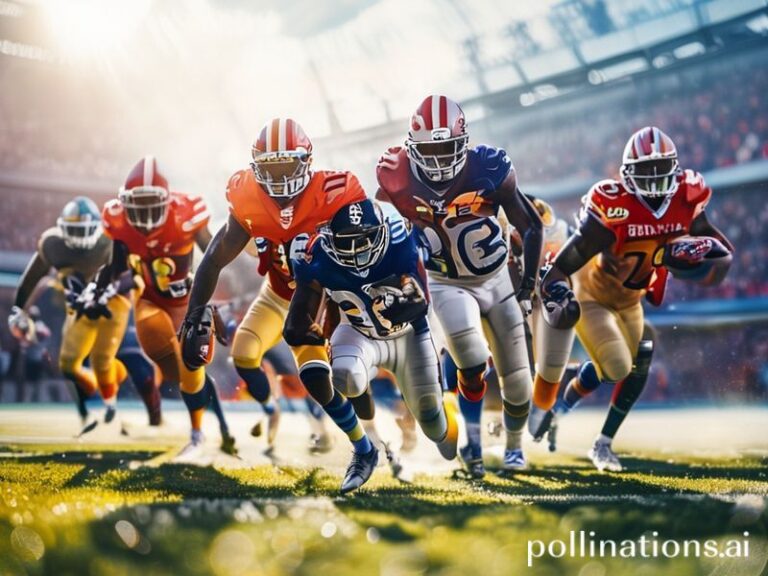Shamelessness Goes Global: How the World Learned to Stop Blushing and Love the Grift
The World’s Newest Luxury Export: Shamelessness, Freshly Unwrapped Daily
by Diego Márquez, roving correspondent, still jet-lagged since 1998
There was a time when the word “shameless” carried the faint whiff of social opprobrium, like stale cigarette smoke clinging to a diplomat’s lapel. No longer. In 2024 it has become the hottest commodity on the planet, shipped in refrigerated containers from Davos boardrooms to TikTok bedrooms, its shelf life apparently eternal. From the corridors of the Kremlin to the comment threads under K-pop fancams, humanity has finally perfected the art of feeling no embarrassment whatsoever—climate catastrophe, genocide, and crypto crashes be damned. The marketing brochures call it “authenticity.” The rest of us call it Tuesday.
Consider the geopolitical bazaar. Last month the president of a mid-sized G-20 nation—let’s call him Presidente V, because naming him would only boost his OnlyFans—was caught red-handed laundering COVID relief funds through a shell company registered in the British Virgin Islands. The evidence, a PowerPoint so sloppy it could have been assembled by interns on their third espresso, was presented on live television. His response? A shrug, a wink, and an NFT drop featuring pixelated selfies of his own arrest. Within 24 hours the collection sold out, yielding enough to finance the next election cycle and a modest beachfront villa in Malibu. The electorate, half-starved and fully online, applauded the hustle. Somewhere, Machiavelli’s ghost updated its LinkedIn profile: “Influencer, 15th-century Italy.”
Meanwhile, in the private sector, Silicon Valley has commoditized shamelessness so efficiently that it now trades on Nasdaq under the ticker $SHME. The prospectus promises “negative guilt margins” and “infinite spin cycles.” Early investors include several Gulf sovereign wealth funds and—because irony is also publicly traded—three Scandinavian pension schemes that once prided themselves on ethical divestment. Analysts project exponential growth, citing a global supply chain of outrage that is both renewable and entirely homegrown. Children in Jakarta stitch diss tracks for Midwestern teenagers; Filipino call-center agents ghostwrite apology videos for disgraced German influencers. Everyone wins except, well, everyone.
Europe, ever nostalgic, tried to bottle the old vintage of shame and slap a Protected Designation of Origin label on it. The European Parliament proposed a “Digital Dignity Act” that would require politicians to blush visibly upon telling lies. Unfortunately, the biometric blush technology was subcontracted to the same firm that fitted Volkswagen emissions labs, and the prototypes kept bursting into flames. The bill now languishes in committee, right next to the EU’s strategic reserve of moral superiority.
Asia, never one to miss a trend, has gamified the phenomenon. In Seoul, pop-up “Shame Cafés” allow patrons to confess tax evasion or adultery in exchange for artisanal dalgona coffee and a commemorative Polaroid. The most viral booth is the “Dictator’s Confessional,” where users role-play kleptocracy and leave with a souvenir offshore account number. Attendance is highest among junior civil servants who claim it’s “team-building.” Their bosses, naturally, deduct it as R&D.
Africa, accustomed to being lectured by the rest of us, has turned the tables. Nigerian satirists now export scathing sketch comedy to Netflix, where Western audiences binge-watch depictions of European colonialism with the same glazed enthusiasm they once reserved for true-crime documentaries. The joke is on the algorithm: every click trains it to recommend more content exposing the viewer’s own complicity. The continent’s fastest-growing export is thus a mirror, wholesale price negotiable.
Latin America, always avant-garde in matters of magical realism, has elected a literal clown to congress—again. He campaigns on a platform of balloon-animal economics and performs his own impeachment hearings as stand-up. Pollsters credit his success to “extreme relatability,” by which they mean voters prefer a buffoon who admits he’s a buffoon to the usual kind who pretends otherwise. The IMF, ever the killjoy, has downgraded the country’s credit rating to “laughable.” The bond markets responded by issuing a new tranche of zero-interest whoopee cushions.
So what does it all mean for the average, moderately ashamed reader? Only that shamelessness has become a global public good, like breathable air except more plentiful and significantly more carcinogenic. We are living through the largest transfer of embarrassment in human history, from the guilty to the guiltless, from the powerless to the powerful, from you to whoever is currently monetizing your attention. The good news: shipping is free. The bad news: returns are impossible.
In the duty-free lounge of history, the loudspeaker crackles: “Final call for Flight 404 to the Post-Shame Society. Please leave your decency at the gate.” We shuffle aboard, pretending we still have a choice, while the safety video features a billionaire in a fireproof suit explaining that oxygen masks will not drop because, really, who needs to breathe when you can simply never exhale?







